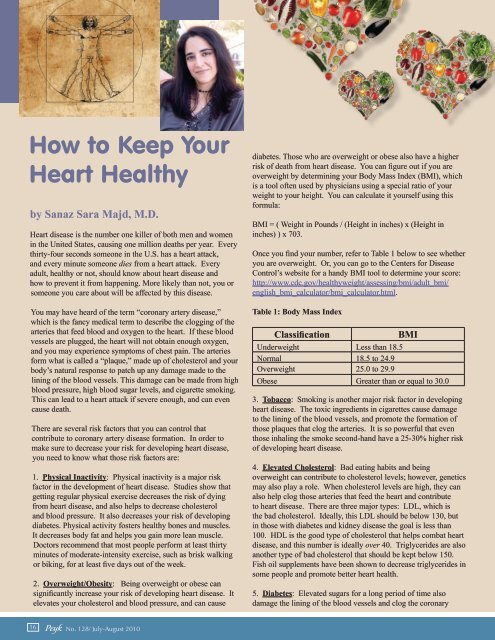English Section - Persian Cultural Center
English Section - Persian Cultural Center
English Section - Persian Cultural Center
You also want an ePaper? Increase the reach of your titles
YUMPU automatically turns print PDFs into web optimized ePapers that Google loves.
How to Keep Your<br />
Heart Healthy<br />
by Sanaz Sara Majd, M.D.<br />
Heart disease is the number one killer of both men and women<br />
in the United States, causing one million deaths per year. Every<br />
thirty-four seconds someone in the U.S. has a heart attack,<br />
and every minute someone dies from a heart attack. Every<br />
adult, healthy or not, should know about heart disease and<br />
how to prevent it from happening. More likely than not, you or<br />
someone you care about will be affected by this disease.<br />
You may have heard of the term “coronary artery disease,”<br />
which is the fancy medical term to describe the clogging of the<br />
arteries that feed blood and oxygen to the heart. If these blood<br />
vessels are plugged, the heart will not obtain enough oxygen,<br />
and you may experience symptoms of chest pain. The arteries<br />
form what is called a “plaque,” made up of cholesterol and your<br />
body’s natural response to patch up any damage made to the<br />
lining of the blood vessels. This damage can be made from high<br />
blood pressure, high blood sugar levels, and cigarette smoking.<br />
This can lead to a heart attack if severe enough, and can even<br />
cause death.<br />
There are several risk factors that you can control that<br />
contribute to coronary artery disease formation. In order to<br />
make sure to decrease your risk for developing heart disease,<br />
you need to know what those risk factors are:<br />
1. Physical Inactivity: Physical inactivity is a major risk<br />
factor in the development of heart disease. Studies show that<br />
getting regular physical exercise decreases the risk of dying<br />
from heart disease, and also helps to decrease cholesterol<br />
and blood pressure. It also decreases your risk of developing<br />
diabetes. Physical activity fosters healthy bones and muscles.<br />
It decreases body fat and helps you gain more lean muscle.<br />
Doctors recommend that most people perform at least thirty<br />
minutes of moderate-intensity exercise, such as brisk walking<br />
or biking, for at least five days out of the week.<br />
2. Overweight/Obesity: Being overweight or obese can<br />
significantly increase your risk of developing heart disease. It<br />
elevates your cholesterol and blood pressure, and can cause<br />
diabetes. Those who are overweight or obese also have a higher<br />
risk of death from heart disease. You can figure out if you are<br />
overweight by determining your Body Mass Index (BMI), which<br />
is a tool often used by physicians using a special ratio of your<br />
weight to your height. You can calculate it yourself using this<br />
formula:<br />
BMI = ( Weight in Pounds / (Height in inches) x (Height in<br />
inches) ) x 703.<br />
Once you find your number, refer to Table 1 below to see whether<br />
you are overweight. Or, you can go to the <strong>Center</strong>s for Disease<br />
Control’s website for a handy BMI tool to determine your score:<br />
http://www.cdc.gov/healthyweight/assessing/bmi/adult_bmi/<br />
english_bmi_calculator/bmi_calculator.html.<br />
Table 1: Body Mass Index<br />
Classification<br />
BMI<br />
Underweight Less than 18.5<br />
Normal 18.5 to 24.9<br />
Overweight 25.0 to 29.9<br />
Obese Greater than or equal to 30.0<br />
3. Tobacco: Smoking is another major risk factor in developing<br />
heart disease. The toxic ingredients in cigarettes cause damage<br />
to the lining of the blood vessels, and promote the formation of<br />
those plaques that clog the arteries. It is so powerful that even<br />
those inhaling the smoke second-hand have a 25-30% higher risk<br />
of developing heart disease.<br />
4. Elevated Cholesterol: Bad eating habits and being<br />
overweight can contribute to cholesterol levels; however, genetics<br />
may also play a role. When cholesterol levels are high, they can<br />
also help clog those arteries that feed the heart and contribute<br />
to heart disease. There are three major types: LDL, which is<br />
the bad cholesterol. Ideally, this LDL should be below 130, but<br />
in those with diabetes and kidney disease the goal is less than<br />
100. HDL is the good type of cholesterol that helps combat heart<br />
disease, and this number is ideally over 40. Triglycerides are also<br />
another type of bad cholesterol that should be kept below 150.<br />
Fish oil supplements have been shown to decrease triglycerides in<br />
some people and promote better heart health.<br />
5. Diabetes: Elevated sugars for a long period of time also<br />
damage the lining of the blood vessels and clog the coronary<br />
16 No. 128/ July-August 2010

















